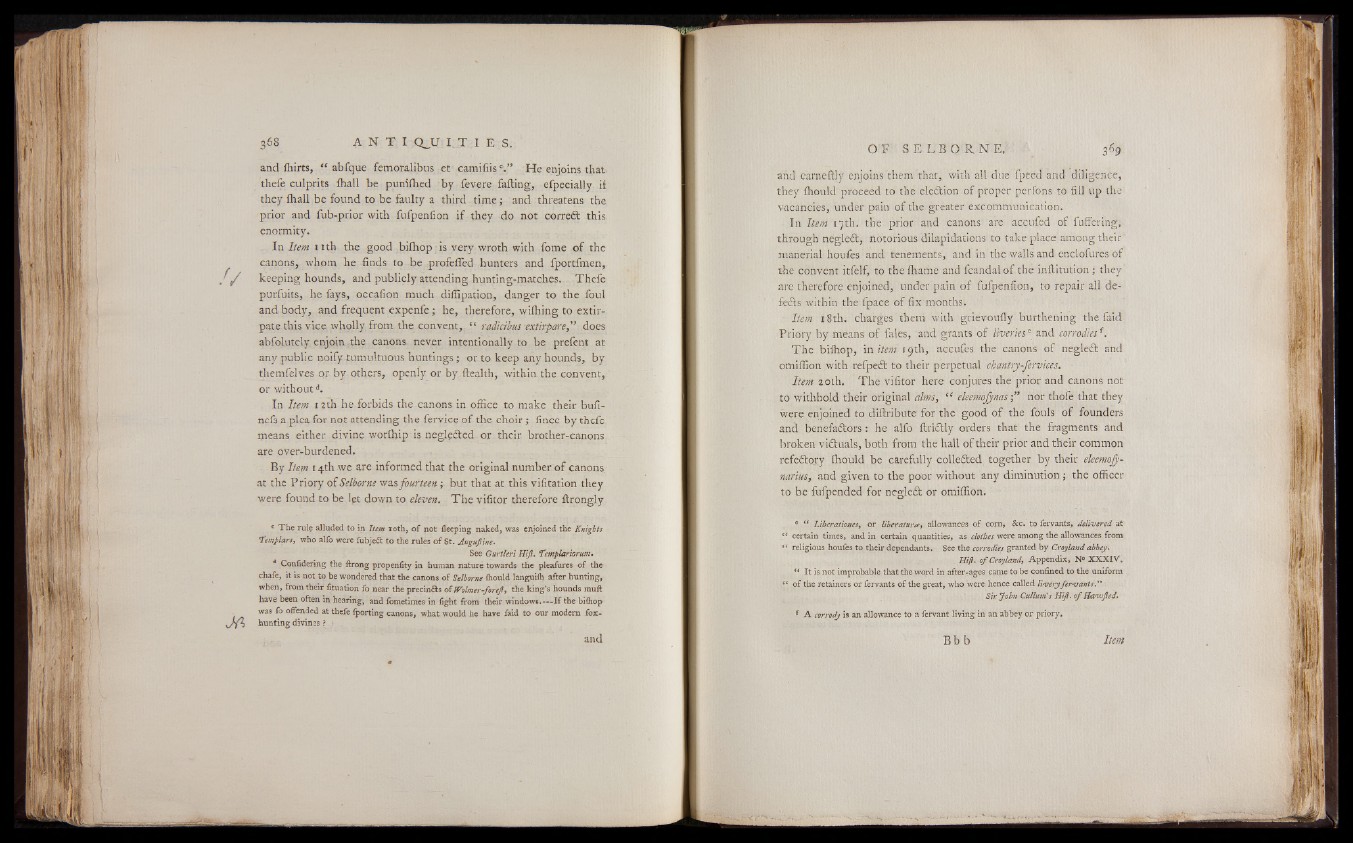
and fhirts, “ abfque femoralibus et camifiis0.” He enjoins that
thefe culprits lhall be punifhed by fevere faffing, efpecially if
they fhall be found to be faulty a third time; and threatens the
prior and fub-prior with fufpenfion if they do not correft this
enormity.
In Item n th the good bilhop is very wroth with fome of the
canons, whom he finds to be profefled hunters and fportfmen,
J / keeping hounds, and publicly attending hunting-matches. Thefe
purfuits, he fays, occafion much diffipation, danger to the foul
and body, and frequent expenfe; he, therefore, wilhing to extirpate
this vice wholly, from the convent,. It radicibus extirpare,” does
abfolutely enjoin,the canons never intentionally to be prefent at
any public noify tumultuous huntings; or to keep any hounds, by
themfelves or. by others, openly or by.fteffith, within, the convent,
or withoutd.
In Item 12th he forbids the canons in office to make their bufi-
nefs a plea for not attending the fervice of die choir; fince by thefe
means either divine worffiip is neglected or their brother-canons
are over-burdened,
By Item 14th we are informed that the original number o f canons,
at the Priory of Selborne was fou rteen but that at this vifitation they
were found to be let down to eleven. The vifitor therefore ftrongly
c T h e rule alluded to in Item ioth, o f not fleeping naked, was enjoined the Knights
Templars, who alfo were fubjett to the rules o f St. Augufiine.
See Gurtleri Hifl. Templartorum.
4 Confidering the ftrong propenfity in human nature towards the pleaiures o f the
chafe, it is not to be wondered that the canons o f Selborne ftiould languilh after hunting,
when, from their lituation fo near the precin&s o f Wolmer-foref, the king’s hounds mull
have been often in hearing, and fometimes in fight from their windows.— I f the bifhop
was fo offended at thefe fporting canons, what would he have faid to our modern fox-
hunting divines ? )
and
and carneffly enjoins them that, with all due fpeed and diligence,
they fliould proceed to the election of proper perfons to fill up the
vacancies, under pain of the greater excommunication.
In Item '17th. the prior and canons are accufed of fuffering,
through negleft, notorious dilapidations to take place among their
manerial houfes and tenements, and in the walls and enclofures of
the convent itfelf, to the fhame and lcandalof the inffitution; they
are therefore enjoined, under pain of fufpenfion, to repair all defers
within thefpace of fix months.
Item 1 8th. charges them with grievoully burthening the faid
Priory by means of fales, and grants of liveriese and corrodiesf.
The bilhop, in item 19th, accufes the canons of negledt and
omiflion with refpedt to their perpetual chantry-fervices.
Item 20th. The vifitor here conjures the prior and canons not
to withhold their original alms, “ eleemofynasnor thofe that they
were enjoined to diflxibute for the good of the fouls of founders
and benefaftors : he alfo ftriftly orders that the fragments and
broken vidtuals, both from the hall of their prior and their common
refettory ffiould be carefully collefted together by their eleemojy-
narius, and given to the poor without any diminution; the officer
to be fufpended for negledt or omiflion.
e “ Liberationes, or liberatura, allowances o f corn, See. to fervants, delivered at
tc certain times, and in certain quantities, as clothes were among the allowances from
“ religious houfes to their dependants. See the corrodie? granted by Cropland abbey.
Hi ft. o f Croyland, Appendix, N° XXX IV .
lt It is not improbable that the word in after-ages came to be confined to the uniform
** o f the retainers or fervants o f the great, who were hence called livery fervants.”
Sir John Cullum's Hiß. o f Havified.
f A corrody is an allowance to a fervant living in an abbey or priory.
B b b Item